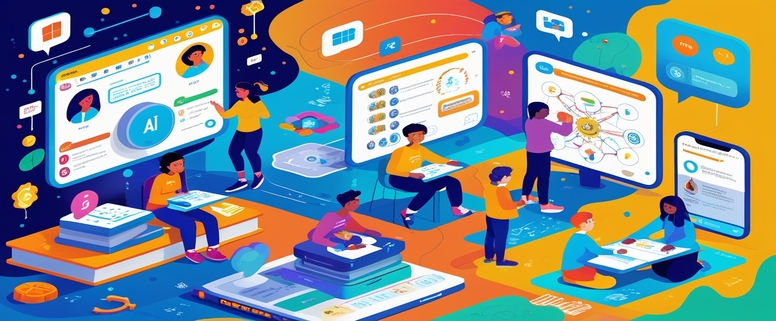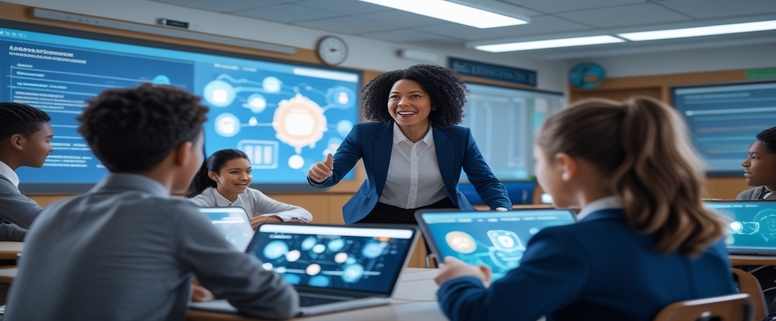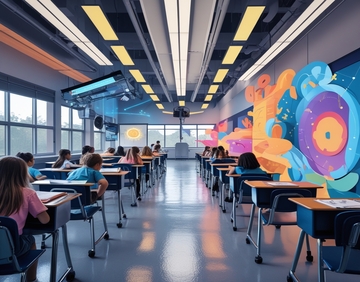Introduction: The Outdated Factory Model of Education
For over a century, our educational systems have remained anchored to an industrial-era framework that treats students as standardized products on an assembly line rather than unique individuals with diverse talents and needs. This model, designed to create uniform workers for factories and offices, continues to dominate despite dramatic shifts in our society, economy, and understanding of human cognition. The result is a profound misalignment between how we teach and how humans actually learn—a gap that particularly impacts neurodivergent learners, who often possess extraordinary gifts that conventional education fails to recognize and nurture.
As someone who has navigated educational systems while managing conditions such as ADHD, dyslexia, and other neurodivergent traits, I've experienced firsthand the limitations of standardized education. My return to academia after two decades in various professional roles has only reinforced this perspective: our current approaches are not just inefficient—they actively suppress the unique cognitive styles and talents that fuel innovation and creative problem-solving.
The Limitations of Standardized Learning
The industrial model of education is built on several problematic assumptions:
Problematic Assumptions
- Uniform Pacing: All students are expected to learn at the same rate, despite vast differences in processing speeds, attention patterns, and cognitive styles.
- Standardized Assessment: Success is measured through uniform testing that rewards specific types of thinking while penalizing others.
- Linear Progression: Learning is treated as a sequential process, ignoring the non-linear, interconnected ways in which human understanding actually develops.
- Passive Knowledge Consumption: Students primarily receive information rather than actively engaging with and constructing knowledge.
- One-Size-Fits-All Delivery: Educational content is typically presented in limited formats that fail to accommodate diverse learning needs.
These limitations affect all students, but they create particularly significant barriers for neurodivergent learners, who may process information in fundamentally different ways. A student with dyslexia might struggle with text-based learning but excel in visual-spatial reasoning. A learner with ADHD might appear disengaged with standardized content but demonstrate remarkable focus and creativity when pursuing topics of interest.
The consequences extend beyond academic performance to impact self-esteem, mental health, and future career prospects. When education consistently fails to recognize and value diverse cognitive styles, it reinforces the harmful notion that there is only one "correct" way to think and learn.
AI as the Great Equalizer: Recognizing Individual Potential
Artificial intelligence offers unprecedented opportunities to transcend these limitations and create truly personalized learning experiences. Unlike traditional educational approaches, carefully engineered AI systems can:
AI Capabilities
- Adapt in Real Time: AI can adjust content, pacing, and presentation based on individual student performance and engagement, providing immediate support when needed.
- Recognize Diverse Cognitive Patterns: Advanced pattern recognition allows AI to identify unique learning styles and accommodate them without judgment or preconceptions.
- Provide Multimodal Learning Experiences: AI can transform content into multiple formats—visual, auditory, interactive—to match individual preferences and strengths.
- Offer Unlimited Patience and Availability: AI assistants can provide consistent support without fatigue, frustration, or time constraints.
- Gather and Analyze Detailed Learning Data: AI can track subtle patterns in learning behavior to continuously refine and optimize educational experiences.
Research demonstrates that AI-enhanced learning environments can increase student engagement by up to 35% across diverse student populations, with even more significant improvements for neurodivergent learners. For students with conditions like dyslexia, ADHD, and autism, personalized AI learning tools have shown potential to improve academic outcomes by 20-25% while significantly enhancing accessibility and inclusion. For more details, see my complete Transforming Education Through Artificial Intelligence proposal.

The "Learning is Fun" Platform: Engineered for Individual Potential
Central to my vision for AI-powered education is the "Learning is Fun" platform—an advanced learning environment that adapts to individual cognitive styles using sophisticated prompt engineering. Unlike conventional educational software that simply digitizes traditional content, this platform fundamentally reimagines the learning experience through:
Platform Features
- Cognitive Style Mapping: The platform begins by establishing a detailed understanding of each student's unique learning profile—identifying strengths, preferences, and areas where support is needed.
- Dynamic Content Adaptation: Educational materials automatically transform to match individual learning styles, whether that means converting text to visual representations, adding interactive elements, or adjusting complexity.
- Engagement Optimization: The system continuously monitors engagement signals and adjusts its approach to maintain optimal learning conditions, preventing both frustration and boredom.
- Strength-Based Pathways: Rather than focusing exclusively on remediating weaknesses, the platform identifies and leverages each student's cognitive strengths as pathways to mastering challenging content.
- Metacognitive Development: Students gain insights into their own learning processes, fostering self-awareness and agency in their educational journey.
The platform employs advanced prompt engineering to create personalized and engaging experiences, with research indicating up to 40% improvement in comprehension for neurodivergent students. By leveraging these techniques, the system can present the same fundamental concepts in ways that resonate with diverse cognitive styles. These approaches are detailed in the PromptSage Framework paper.
Specialized AI Tutoring: MathSage and Beyond
Complementing the core platform are specialized AI tutoring assistants designed for specific subject areas and learning challenges. MathSage, our mathematics-focused assistant, exemplifies this approach by providing personalized mathematical support while maintaining high academic standards. A prototype of MathSage is available in the ChatGPT Store.
MathSage employs several innovative features:
MathSage Features
- Problem-Solving Guidance: Rather than simply providing answers, MathSage offers step-by-step prompts that guide students through mathematical reasoning processes.
- Conceptual Explanations: The system uses chain-of-thought prompting to build deeper understanding of mathematical concepts, not just procedural knowledge.
- Adaptive Practice: MathSage generates personalized exercises that scale in difficulty based on student progress, ensuring appropriate challenge without overwhelming learners.
- Multiple Representation Strategies: Mathematical concepts are presented through diverse approaches—visual, numerical, symbolic, and contextual—to accommodate different cognitive styles.
- Error Pattern Analysis: The system identifies recurring mistakes to address underlying conceptual misunderstandings, not just surface-level errors.
What makes MathSage particularly powerful is its dual-mode functionality. In Tutor mode, it provides rich explanations and guidance; in Examiner mode, it assesses understanding without revealing solutions. This separation ensures academic integrity while still providing comprehensive learning support.
Similar specialized assistants are being developed for language acquisition, scientific inquiry, and creative expression, each employing AI techniques optimized for their specific domain.

Implementation and Real-World Impact
The vision I've outlined isn't merely theoretical—it's grounded in practical implementation strategies and emerging research. Initial implementations of these AI-enhanced learning systems have demonstrated several significant benefits:
Significant Benefits
- Teacher Empowerment: By automating administrative tasks and providing detailed learning analytics, AI tools can reduce teacher administrative workload by up to 40%, allowing educators to focus on human connection and creativity.
- Inclusive Learning Environments: Schools adopting AI-enhanced personalized learning report increased participation from previously marginalized students and reductions in behavior incidents.
- Accelerated Progress: Students who previously struggled with traditional instruction often show remarkable acceleration when provided with AI tools matched to their learning styles.
- Improved Self-Efficacy: When educational experiences consistently adapt to their needs, students develop greater confidence in their learning abilities and willingness to tackle challenges.
- Reduced Support Gaps: AI tools can provide immediate assistance, helping to address the chronic shortage of support services that often leaves neurodivergent students waiting months or years for essential help.
The implementation framework follows a phased approach, beginning with infrastructure assessment and teacher training, progressing through platform deployment and specialized tool implementation, and culminating in data-driven refinement and expansion.
Conclusion: Education That Celebrates Every Mind
The AI-powered learning revolution represents more than just technological advancement—it embodies a fundamental shift in how we understand and value human potential. By leveraging artificial intelligence, we can create educational environments where:
• Neurodiversity is celebrated as a strength, not treated as a deficit
• Every learner receives personalized support that honors their unique cognitive style
• Teachers are empowered as mentors, guides, and connectors rather than content distributors
• Learning becomes an engaging, joyful process of discovery rather than a standardized requirement
This vision aligns with Ireland's Digital Strategy for Schools to 2027 and the National AI Strategy Refresh 2024, as well as broader international frameworks for inclusive education. For a deeper philosophical exploration of this perspective, see my Reflections on Humanity and AI.
The industrial era created schools that treated students as interchangeable parts. The information age perpetuated this model through digitized versions of standardized content. Now, the AI revolution offers us the opportunity to transcend these limitations and create truly personalized learning—education that adapts to the student rather than forcing the student to adapt to education.
By embracing AI-powered personalized learning, we aren't just improving academic outcomes—we're reshaping education to honor the full spectrum of human potential. The time for this transformation is now, and the tools to achieve it are within our reach.





